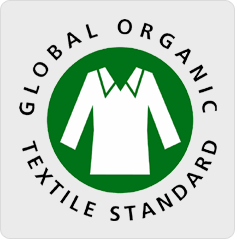The aim of the standard is to define requirements to ensure organic status of textiles, from harvesting of the raw materials, through environmentally and socially responsible manufacturing up to labelling in order to provide a credible assurance to the end consumer. This standard for organic textiles covers the production, processing, manufacturing, packaging, labelling, exportation, importation and distribution of all natural fibres. The final products may include, but are not limited to fibre products, yarns, fabrics and clothes. The standards focus on compulsory criteria only.
First of all, the fibres should be natural and have to be grown in an organic way, based on the production standards such as those laid down in the EEC-Regulation 2092/91, or NOP regulations.
Second, the entire production process should be taken into account. This means that every processing step must meet certain criteria. The criteria for the production process are laid down in the Global Organic Textile Standards (GOTS). They encompass every process-step of textile production (spinning, weaving, washing, etc) and for every step it is laid down which processing aids may (not) be used, in order to gain as much environmental profit as possible.

